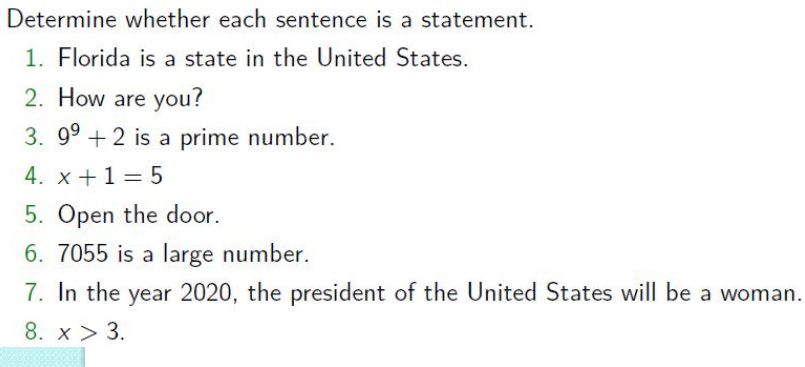LOGIC AND REASONING
1/45
There's no tags or description
Looks like no tags are added yet.
Name | Mastery | Learn | Test | Matching | Spaced | Call with Kai |
|---|
No study sessions yet.
46 Terms
the science of reasoning, proof, thinking or inference
Logic
allows us to analyze arguments and determine whether it is valid or invalid
Logic
a tool used in mathematical proofs
Logic
Includes: a language for expressing complicated compound statements, a concise notation for writing them, and a methodology for objectively reasoning about their truth or falsity.
Logic
Who tried to advance the study of logic from a merely philosophical subject to a formal mathematical subject. He never completely achieved this goal.
Gottfried Wilhelm Leibniz (1646 - 1716)
They contributed to the advancement of symbolic logic as a mathematical discipline
Augustus de Moegan (1806 - 1871) and George Boole (1815 - 1864)
Boole published this in 1848.
The Mathematical Analysis of Logic
Boole published this in 1854 as more extensive work
An Investigation of the Laws of Thought
a declarative sentence that is either true or false, but not both true and false
statement

Yes
No
Yes
Yes
No
Yes
Yes
Yes
is a statement that conveys a single idea
simple statement
is a statement that conveys two or more ideas
compound statement
Connecting simple statements with words and phrases such as and, or, if...then, and if and only if creates a
compound statement
“not p”
Give the:
connective
symbolic form
type fo statement
not
~p
negation
“p and q”
Give the:
connective
symbolic form
type fo statement
and
p^q
conjunction
“p or q”
Give the:
connective
symbolic form
type fo statement
or
pVq
disjunctions
“if p then q”
Give the:
connective
symbolic form
type fo statement
if..then
p—>q
conditional
“p if and only if q”
Give the:
connective
symbolic form
type fo statement
if and only if
p < —> q
biconditional
What do you call if a compound statement is written in symbolic form, then parenthesis are used to indicate which simple statements are grouped together
Grouping symbols
either true (T) or false (F).
truth value of a simple statement
depends on the truth values of its simple statements and its connectives.
truth value of a compound statement
is a table that shows the truth value of a compound statement for all possible truth values of its simple statements
A truth table
Two statements are equivalent if they have the same truth value for all possible truth values of their simple statements
Equivalent Statements
Equivalent Statements are denoted by
≡
~(pVq) ≡ ~p^~q
~(p^q) ≡ ~p V~q
De Morgan’s Law for Statements
shows an implication; that is, given that a situation p will happen
Conditional Statement
It is part of a conditional statement that talks about situation p will happen
antecedent or hypothesis
It is part of a conditional statement that talks about another situation q will happen
consequence or conclusion
True or false: Most theorems in mathematics are in the form of a conditional
true
If p, q.
p implies q.
q, if p.
q when p.
p is sufficient for q.
q is necessary for p.
p only if q.
q whenever p.
q follows from p
Are examples of
other ways to express p—>q
two-way conditional statements
Biconditional Statements
is a statement that is always true.
tautology
is a statement that is always false
self-contradiction
consists of a set of statements called premises and another statement called the conclusion.
argument
if the conclusion is true whenever all the premises are assumed to be true
argument is valid
if it is not a valid argument.
argument is invalid
is the process of reaching a general conclusion by examining specific examples
Inductive reasoning
The conclusion formed by using inductive reasoning is often called a
conjecture
true or false: Inductive reasoning is used when we predict the next number in a sequence.
true
Galileo Galilei used inductive reasoning to discover that the time required for a pendulum to complete one swing, called the __ depends on the length of the pendulum.
period of the pendulum
Is it true that Galileo did not have a clock, so he measured the periods of pendulums in “heartbeats.
true
A statement is a true statement provided that it is true in all cases.
Counterexamples
If you can find one case for which a statement is not true then the statement is a false statement.
counterexample
is the process of reaching a conclusion by applying general assumptions, procedures, or principles
Deductive reasoning
Is it true that the conclusions reached by deductive reasoning are valid and can be relied on?
true
“During the past 10 years, a tree has produced plums every other year. Last year the tree did not produce plums, so this year the tree will produce plums”
is this inductive or deductive?
inductive